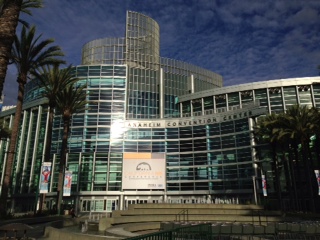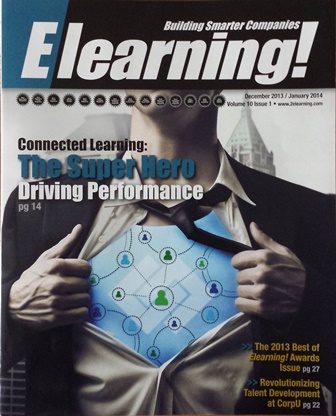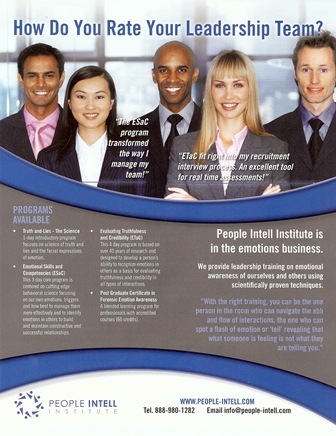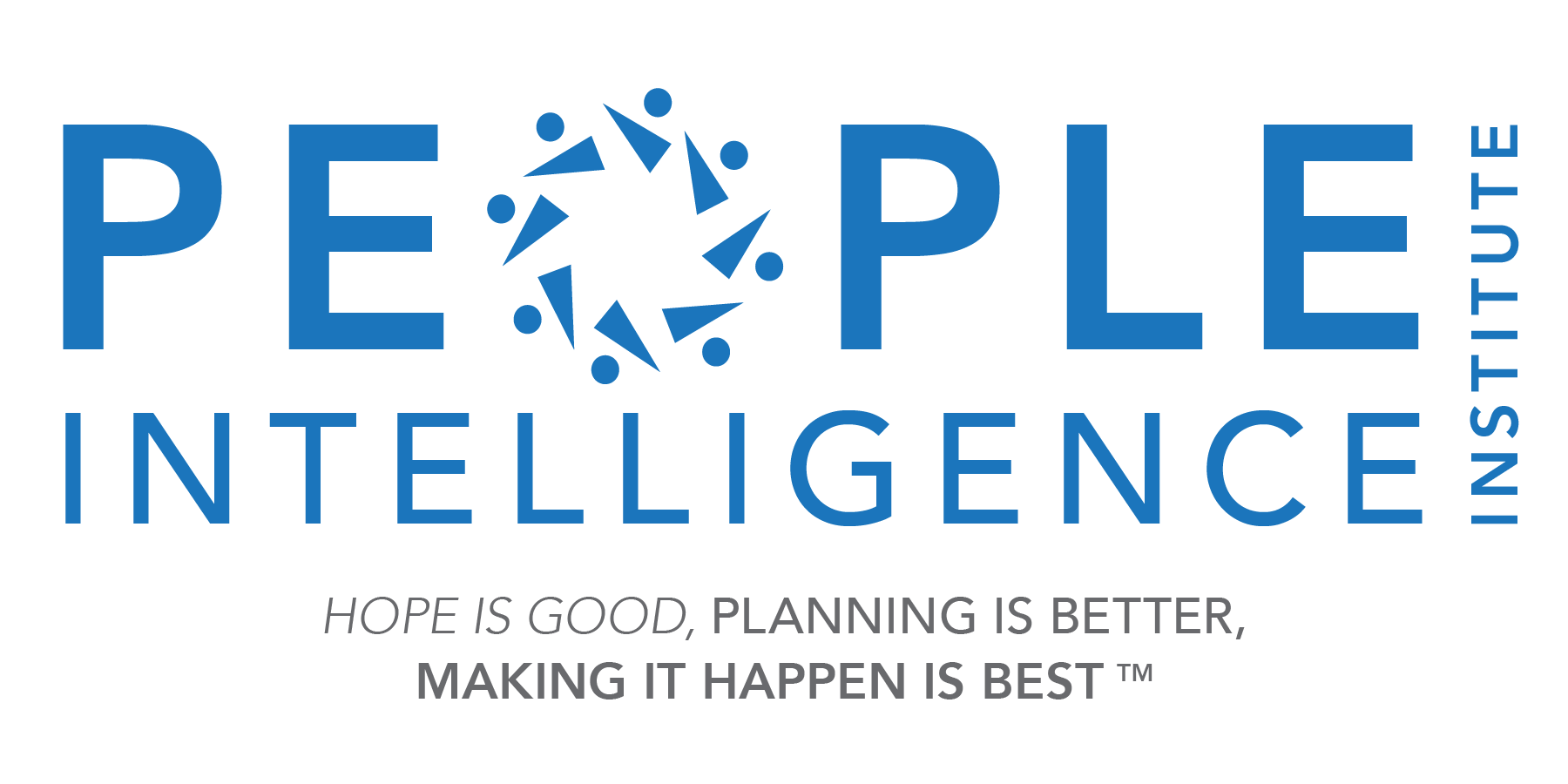"This course has helped train my eye and my mind to see more emotions in others, and as a result, have more successful interactions with others when they are emotional. I am more likely to notice things earlier, before escalation, when the potential to make better choices is stronger."
Read MoreInterview on The Bronc - Emotional Intelligence and Awareness

An interview with Mike Palestina on Rider University's "The Bronc."
In an effort to give back each month Mike volunteers his knowledge of career planning and his coaching services to professionals who find themselves in transition due to the current economic conditions. His focus is on building an executable job search strategy that includes practical tips on effective networking, interviewing and negotiation. Mike is regularly invited to speak on these topics across New Jersey at Department of Labor and Professional Services Group events.
"I believe that emotional awareness of ourselves and others and effectively managing those emotions are essential skills required for successful leadership. My position is supported by research conducted by Harvard University, Carnegie Institute of Technology and many others.
The Harvard study concluded that EQ is twice as important as IQ and functional expertise in career success. The Carnegie Institute of Technology study shows that 85 percent of your financial success is due to skills in “human engineering,” your personality and ability to communicate, negotiate, and lead.
Over the last 10+ years I have used emotional awareness and verbal and non-verbal communications to enhance my one-on-one executive coaching and team coaching services."
Listen to Mike discuss the most vital leadership skill...emotional awareness and competencies.
Nov. 10, 2013 http://www.1077thebronc.com/?page_id=356
The Peaceful Deceit
Were you to ask a random sampling of people in your work-a-day world to rate lying as either good or bad, most would say it is a bad thing. It's a simplistically posed question requiring an easy answer.
Asked to elaborate those same people may repeat aphorisms such as:
- One lie leads to another.
- A liar must have a great memory.
- For every lie you tell, you must tell ten more to cover it up.
- "Oh what a tangled web we weave..."
Ask someone if they are a liar and they will bristle. The mere implication of mistrust can damage relationships. "How dare you?"
But what is a lie beyond this simple definition? A lie is the expression of a statement known by the teller to be in some way inconsistent with or in opposition to what one knows to be true. There is no moral judgment in that statement - it only presents a definition. The moral or ethical aspects only come into play when one considers the objective of the deceiver and the intention to harm. The con man, the cheat, the unctuous politician and other scoundrels have all contributed to the association of being a liar with being a reprobate.
There are times however when saying something we know to be untrue seems to be the best option in the moment. Lies are told to conform to social situations - "Yes, the food was delicious." They are told to make someone feel good - "No, that outfit doesn't make you look fat at all."
We often mask our true feelings because we are unwilling to confront what the truth will unveil. So we tell ourselves that we did the right thing by not being forthright, despite the fact, strictly speaking, we told a lie. The French writer Vauvenargues said, “The art of pleasing is the art of deception."
This notion of pleasing brings us to what the title alludes, what social psychologist Irving Janis called "concurrence seeking" in 'groupthink' situations. It is the tendency to seek concurrence (conformance) with a group to finalize what may be a bad decision. No one wants to be seen as the enemy of the group.
A project manager in charge of a team must guard against groupthink. The manager must learn to recognize that an opinion being offered is not necessarily honest, but given to succumb to environmental pressures to keep the project moving forward or to please the boss. But it's groupthink that keeps everyone paddling in the direction of the waterfall.
An interesting take on this comes from the sports world, where Coach Riches of Functional Basketball Coaching wrote, "Groupthink is one of the poorest situations that can happen to a group in their development into a team. Groupthink limits the opportunity for trust, honesty and solidarity to develop and ultimately, for a team to reach their true potential." The coach goes on to discuss how a strong leader can sway the group in one direction, thus compelling the group to conform rather than buck the leader because they wish to be seen as a team player.
This kind of collective dishonesty inhibits sincere debate. It creates an atmosphere where people don't feel engaged in the discussion but corrupted by it. Collectively, the group fails the project because the individuals fail the group. That said, in a competitive work dynamic where connections and cooperation matter, no one wants to be cast as an outsider. A leader with a fragile ego may accuse one who speaks openly of not being a team player, but what the leader really means is, "it's a bad move to disagree with me."
The leader's job is to repress the ego and seek differing opinions. As Janis points out, there is a danger in replacing esprit de corps with groupthink. There is no longer a place for independent thinking. Honest debate can lead to the truth. The flexible leader recognizes groupthink as ultimately undermining to the long-range mission of the company. Coach Riches believes a leader should "crave openness" because it leads to solidarity. When everyone is truthful there is greater understanding, so that even if someone dissents, it is done honestly. The leader can move the project forward knowing the team is truly accepting and supportive of the final decision.
A good leader must learn to recognize when someone isn't being honest, not to uncover malice but to avoid the destructive nature of groupthink. A leader creates an environment that encourages people to say what they honestly feel. For as Benjamin Disraeli said, "Never apologize for showing feeling. When you do, you apologize for the truth."
Emotional Clarity
 In his memoir, "A Drinking Life", Pete Hamill said drinking takes away two of a writer's most valuable tools, clarity and memory.
In his memoir, "A Drinking Life", Pete Hamill said drinking takes away two of a writer's most valuable tools, clarity and memory.
Clarity is energizing. Clarity is illuminating. Without it your path forward is uncertain, murky and frustrating. Your goals are fuzzy and your optimism almost non-existent. The master motivator Tony Robbins says, "In order to have an extraordinary life you must have an extraordinary psychology." That state requires clarity of purpose. "Clarity is power," Tony declares.
Emotional clarity is a double-bladed plough that cuts through the muck of communication and clears a path for mutual understanding. But like any tool it must be used properly. You must understand its utility and use it intelligently to achieve optimum results. In short; you gotta read the directions.
In a thesis written for Ohio State University in 2007, Samantha Mowrer states that emotional clarity is associated with positive and affective well-being, "...faster rebound from an induced negative mood, adaptive coping styles and affirming attributions for the occurrence of positive events." On the flip side, Mowrer reminds us that poor emotional clarity is negatively related to, "ambivalence over emotional expression, depression, neuroticism, social anxiety and distress" among other downward expressions that leave us vulnerable to skepticism and cynicism.
Ambivalence is demoralizing. Apathy is death to a relationship. Nothing hurts more than when the other person simply doesn't care any longer. Much of what drives work and personal relationships to the brink of disaster is uncertainty - about true feelings, needs, goals and fears. Negative attributes can be upended toward a positive bias with emotional clarity. It's the ability to project a clear message, grounded in mindfulness, attentiveness, compassion and truth. It's knowing 'what' so you can know 'how'.
Like any useful tool, it takes time, effort and purposeful practice to attain a level of expertise. It begins by asking two simple questions: What are emotions? How are they expressed?
In order to self-regulate emotions we have to be aware of what they are. In order to empathize with others we need to recognize how emotions are integral to the manner and meaning of their efforts to communicate. In order to cope, adapt, support, affirm, understand and focus, we must pay attention, not just to words but to totality of expression.
Here's a quick example. One of your engineers has been working on a project that has the potential to double the top line growth of your company. On paper his ideas are sound, innovative and well-constructed. You direct him to present his ideas to a critical client in the presence of the CEO but you are unaware he has an abject fear of public speaking.
The engineer fails miserably. His brain seizes. His ideas are stilted, he cannot answer questions about his design, he seems unsure at best if his ideas have any merit. The whole event is a crushing.
What happens next? Your judgment is seen as faulty. Your ability to spot good ideas and groom talent are brought into question. You wonder aloud if the engineer even developed the idea on his own. You question his integrity. You begin to doubt your own abilities.
Two things went wrong here: the engineer failed to properly communicate his fears and you failed to spot his emotional reaction to your directive to present his concept. Had there been greater understanding and empathy, you would have made the presentation yourself, with your engineer on hand to answer questions. His lack of fear would have kept his mind relaxed and focused on the facts. The presentation would have had a different outcome. So what's the lesson?
Once you understand what emotions are and how they have an impact on your own behavior, you become better at seeing and understanding both the prevalence and relevance of emotions in the behavior of others, how emotions affect relationships, stability, communication and trust. Clarity of emotions is paramount to successful communication. Clarity is exciting. It empowers your way forward.
Image courtesy of David Castillo Dominici / FreeDigitalPhotos.net
Elearning! Magazine December 2013 /January 2014 Issue

In August of 2013 People Intell had the privilege to speak at the Enterprise Learning! Conference and Expo held in Anaheim, CA. Our session was entitled "Lie To Me: The Science of Emotional Skills and Deception." We are happy to share with you our article that is featured in the December issue of Elearning! Magazine.
The Benefits of Truth within Leadership
The stakes are high. The truth is critical. What can you do to uncover it?
This denouement can play out across the spectrum of personal and professional human interactions. Just reading the words can trigger anxiety as you replay a time in your life when something mattered, when verity determined the difference between the winners and the also-rans.
Leaving aside the existential question of what truth is; we think we know it when it is before us in our everyday lives and we think we know when it's imperfect.
Truth is predicated on emotion. How does she really feel? What is his agenda? Is he listening to me? What is going on here that doesn't feel right? Why do they seem upset and where do we go from here? Why don't my employees communicate with me? How do I determine the truth?
The first step in finding the truth is to understand that emotions, those we reveal and those we try to suppress, are the drivers behind the behavioral and physiological manifestations that in some cases set off our internal alarms alerting us that something is amiss. We can learn to identify and interpret these cues more consistently and reliably to help us evaluate truthfulness.

The more you consider the possible applications for this skill, the more broadly you can relate its uses. To name just a few; imagine yourself managing a difficult team, hiring for a critical position, conducting an internal investigation, choosing a financial advisor, dealing with a complicated family matter, meeting new clients, or assessing the reaction of a focus group to new products.
This article is not about lying in a toxic sense but about the benefits of uncovering the truth of a situation. It's about personal or professional relationships and our ability to engage friends, employers, staff and counterparts honestly, perceptively and effectively. A person may have misgivings about absolute truthfulness for benign reasons. They may elect to mask their true feelings out of a sense of decorum, social norms, an unwillingness to hurt another's feeling, or as guided by context. The concept of dishonesty isn't always about trickery or malice.
The ability to discern the truth in a given situation has obvious advantages, but as a leadership trait, can be invaluable. A leader has the ability to recognize and manage not just his or her own emotions but also those of coworkers, competitors and employees. Executives with leadership presence have been shown to have high emotional intelligence or EQ, as outlined by Daniel Goleman in the Harvard Business Review.
How are emotions tied to deception and why are these concepts so inexorably linked? The full answer extends beyond the limits of this article but in short emotions tell us what matters, and the aforementioned is communicated in the form of expressions on our faces sometimes willingly and other times unwillingly with the world around us. Whether it is expressed openly, implied or repressed such as in the form of micro facial expressions, the cues are almost always there in front of us. Sensing it, recognizing it and functioning within the emotional underpinnings of it are crucial leadership skills. So how can we acquire or improve upon this ability?
We can learn the science of detecting the truth. Emanating from over 40 years of scientific research paired with real life application has illuminated that 5 channels of communication through which people express thoughts and feelings are key in detecting truth and assessing credibility. Underlying the 5 channels (face, body, voice, verbal style and words) is each individual’s baseline. In the context of deception, establishing a baseline is paramount. The baseline is how someone acts, reacts, speaks, gestures and generally interacts with others when they are in a relaxed state, unencumbered by a need to be deceitful about anything, irrespective of motivation. It's how they smile, stand, animate their faces, express ideas or move their hands when they speak. The trained observer, the leader, will be the one who recognizes what's swimming in the undercurrent. The person who understands how emotions instigate actions will bring the truth to the surface. It's why engaging coworkers is so critical to the success of your company.

How can you acquire what some have called "the leadership skill of the 21st century" and why is it so important to understand the science of deception?
"The ability to accurately detect deceit is real," says Paul Ekman, PhD, UCSF professor of psychiatry and principal investigator of a study published in Psychological Science in 1999. Ekman, who has been a leader in this field for decades, was able to demonstrate the role emotions play in deception. They are as inseparable as the water and the wet.
We can improve our odds by developing an understanding of the underlying emotions that precipitate deceptive behavior. The point is not to know the motivation for the deceit, but to know that it exists and to divine the truth which is often folded into emotion. The real goal is not to catch someone in a lie, but to elicit the truth about the situation in an engaging, intuitive, non-confrontational manner that serves the interests of all concerned.
Most importantly, emotional competencies will help managers bring employees back in to the fold, to make them feel a bigger part of the overall success of the mission. Harvard Business Review recently published findings from a Gallup survey that revealed up to 70% of workers are not engaged, meaning they simply don't care or are downright hostile towards employers. Although there are a host of reasons for this attitude, poor emotional intelligence by managers, directors and c-suite leaders prevents them from engaging employees positively, as part of the culture, rather than negatively, as in the dreaded performance review.
Wouldn't it be more efficient to avoid problems in the first place? Wouldn't employees who believe what they do matters be more likely to give a little extra, alert management to problems, interact with staff in a more honest way? Answer this simple question. Which mindset produces better results, a disengaged workforce or one that is self-determined, informed, worthy and relevant in the process?
Improving proficiency in two areas will propel you to a level beyond simply having people skills: emotional competence and detecting deception. With the right training, you can be the one person in the room who can navigate the ebb and flow of emotions, the one who can spot a flash of contempt, happiness, fear, anger, cynicism, sadness or other 'tells' that what someone is feeling is not what they are telling you. By learning to recognize the hidden emotions that leak out through non-verbal cues and micro-facial expressions, you can draw the honesty out of nearly any situation.
